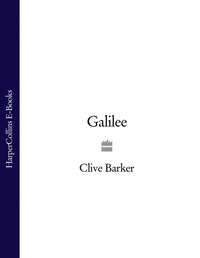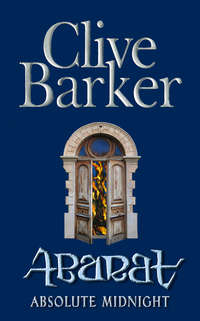
Полная версия
Weaveworld
Of course she’d shrugged off those fears years ago. Here she was, at the wheel of her car, perfect mistress of herself, driving in the fast lane with the sun on her face. What hold could those old anxieties have over her now? Yet as she drove she found herself drawing to her keepsakes from her present life, like talismans to keep that city at bay.
She thought of the studio she’d left behind in London, and the pots she’d left to be glazed and fired when – in just a little while – she got back. She remembered Finnegan, and the flirtatious dinner she’d had with him two nights ago. She thought of her friends, robust and articulate people, any of a dozen of whom she’d trust her life and sanity to. With so much clarity to arm her, she could surely re-tread the paths of her childhood and remain untainted. She travelled a broader, brighter highway now.
Yet the memories were still potent.
Some, like her picturing of Mimi and the house, were images she’d recalled before. One in particular, however, emerged from some hidden niche in her head, unvisited since the day she’d sealed it up there.
The episode didn’t come, as many had, piece by piece. It flashed before her all at once, in astonishing particularity –
She was six. They were in Mimi’s house, she and her mother, and it was November – wasn’t it always? – drear and cold. They’d come on one of their rare visits to Gran’ma, a duty which father had always been spared.
She saw Mimi now, sitting in an armchair near to a fire that barely warmed the soot in the grate. Her face – soured and sad to the brink of tragedy – was pale with powder, the brows meticulously plucked, the eyes glittering even in the dour light through the lace curtains.
She spoke; and her soft syllables drowned out the din of the motorway.
‘Suzanna …’
Addressed from the past, she listened.
‘… I’ve something for you.’
The child’s heart had fallen from its place, and thumped around in her belly.
‘Say thank you. Suzie.’ her mother chided.
The child did as she was told.
‘It’s upstairs.’ Mimi said, ‘in my bedroom. You can go and get it for yourself, can’t you? It’s all wrapped up, at the bottom of the tall-boy.’
‘Go on. Suzie.’
She felt her mother’s hand on her arm, pushing her away towards the door.
‘Hurry up now.’
She glanced at her mother, then back at Mimi. There was no mercy to be had from either: they would have her up those stairs, and no protest would mellow them. She left the room, and went to the bottom of the stairs. They were a mountain-face before her; and the darkness at the summit a terror she tried not to contemplate. In any other house she would not have been so fearful. But this was Mimi’s house; Mimi’s darkness.
She climbed, her hand clinging to the bannister, certain that something terrible awaited her on every stair. But she reached the top without being devoured, and crossed the landing to her grandmother’s bedroom.
The drapes were barely parted: what little light fell between was the colour of old stone. A clock ticked on the mantelpiece, at a quarter the speed of her pulse. On the wall above the clock, gazing down the length of the head-high bed was an oval portrait photograph of a man in a suit that was buttoned up to the neck. And to the left of the mantelpiece, across a carpet that killed her footsteps, was the tall-boy, twice her size and more.
She went to it quickly, determined – now that she was in the room – to do the deed and be out before the ticking had its way with her and slowed her heart ’til it stopped.
Reaching up, she turned the chilly handle. The door opened a little. From inside bloomed the smell of moth-balls, shoe-leather and lavender water. Ignoring the gowns that hung in the shadows she plunged her hand amongst the boxes and tissue paper at the bottom of the tall-boy, hoping to chance upon the present.
In her haste, she pushed the door wide – and something wild-eyed lurched out of the darkness towards her. She screamed. It mocked her, screaming back in her face. Then she was running towards the door, tripping on the carpet in her flight, before hurtling downstairs. Her mother was in the hallway –
‘What is it, Suzie?
There were no words to tell. Instead she threw herself into her mother’s arms – though, as ever, there was that moment when they seemed to hesitate before choosing to hold her – and sobbed that she wanted to go home. Nor would she be placated, even after Mimi had gone upstairs and returned saying something about the mirror in the tall-boy door.
They’d left the house soon after that, and, as far as she could now recall, Suzanna had never since entered Mimi’s bedroom. As for the gift, it had not been mentioned again.
That was the bare bones of the memory, but there was much else – perfumes; sounds; nuances of light – that fleshed those bones. The incident, once exhumed, had more authority than events both more recent and ostensibly more significant. She could not now conjure – nor would ever, she suspected – the face of the boy to whom she’d given her virginity, but she could remember the smell from Mimi’s tall-boy as though it were still in her lungs.
Memory was so strange.
And stranger still, the letter, at the beck of which she was making this journey.
It was the first missive she’d received from her grandmother for over a decade. That fact alone would have been sufficient to have her foresake the studio and come. But the message itself, spindly scrawlings on an air-mail paper page, had lent her further speed. She’d left London as soon as the summons had arrived, as if she’d known and loved the woman who’d written it for half a hundred years.
Suzanna, it had begun. Not Dear nor Dearest. Simply:
Suzanna,
Forgive my scribbles. I’m sick at the moment. I feel weak some hours, and not so weak others. Who knows how I’ll feel tomorrow?
That’s why I’m writing to you now, Suzanna, because I’m afraid of what may happen.
Will you come to see me, at the house? We have very much to say to each other, I think. Things I didn’t want to say, but now I have to.
None of this will make much sense to you. I know, but I can’t be plain, not in a letter. There are good reasons.
Please come. Things are different to the way I thought they’d be. We can talk, the way we should have talked many years ago.
My love to you, Suzanna.
Mimi.
The letter was like a midsummer lake. Its surface placid, but beneath?; such darkness. Things are different to the way I thought they’d be. Mimi had written. What did she mean? That life was over too soon, and her sunlit youth had contained no clue as to how bitter mortality would be?
The letter had been delayed, through the vagaries of the postal service, by over a week. When, upon getting it, she’d rung Mimi’s house she’d received only the number disconnected tone. Leaving the pots she was making unfinished, she had packed a bag and driven North.
2
She went straight to Rue Street, but number eighteen was empty. Sixteen was also deserted, but at the next house a florid woman by the name of Violet Pumphrey was able to offer some explanation. Mimi had fallen sick a few days earlier, and was now in Sefton General Hospital, close to death. Her creditors, which included the Gas and Electricity Boards, and the Council, in addition to a dozen suppliers of food and drink, had immediately made moves to claim some recompense.
‘Like vultures, they were,’ said Mrs Pumphrey, ‘and her not even dead yet. It’s shameful. There they were, taking everything they could lay their hands on. Mind you, she was difficult. Hope you don’t mind my being plain, love? But she was. Kept herself hidden away in the house most of the time. It was a bloody fortress. That’s why they waited, see? ’til she was peggin’ out. If they’d tried to get in with her there they’d have still been tryin’.’
Had they taken the tall-boy? Suzanna idly wondered. Thanking Mrs Pumphrey for her help, she went back to have another look at number eighteen – its roof so covered in bird-shit it looked to have had its own private blizzard – then went on to the hospital.
3
The nurse wore her show of compassion indifferently well. ‘I’m afraid Mrs Laschenski’s very sick. Are you a close relative?’
‘I’m her grand-daughter. Has anybody else been to see her?’
‘Not that I know of. There really isn’t that much point. She’s had a major stroke, Miss –’
‘Parrish. Suzanna Parrish.’
‘Your grandmother’s unconscious most of the time, I’m afraid.’
‘I see.’
‘So please don’t expect too much.’
The nurse led her down a short corridor to a room that was so quiet Suzanna could have heard a petal drop, but that there were no flowers. She wasn’t unfamiliar with death rooms; her mother and father had died three years before, within six months of each other. She recognized the scent, and the hush, as soon as she stepped inside.
‘She’s not been awake today,’ said the nurse, as she stood back to let Mimi’s visitor approach the bed.
Suzanna’s first thought was that there’d been some colossal error. This couldn’t be Mimi. This poor woman was too frail; too white. The objection was on the tip of her tongue when she realized that the error was hers. Though the hair of the woman in the bed was so thin that her scalp gleamed through, and the skin of her face was draped slackly on her skull like wet muslin, this was, nevertheless, Mimi. Robbed of power; reduced by some malfunction of nerve and muscle to this unwelcome passivity; but still Mimi.
Tears rose in Suzanna, seeing her grandmother tucked up like a child, except that she was sleeping not in preparation for a new day but for endless night. She had been so fierce, this woman, and so resolute. Now all that strength had gone, and forever.
‘Shall I leave you alone awhile?’ said the nurse, and without waiting for a reply, withdrew. Suzanna put her hand to her brow to keep the tears at bay.
When she looked again, the old woman’s blue-veined lids were flickering open.
For a moment it seemed Mimi’s eyes had focused somewhere beyond Suzanna. Then the gaze sharpened, and the look that found Suzanna was as compelling as she had remembered it.
Mimi opened her mouth. Her lips were fever-dried. She passed her tongue across them to little effect. Utterly unnerved, Suzanna approached the bedside.
‘Hello,’ she said softly. ‘It’s me. It’s Suzanna.’
The old woman’s eyes locked with Suzanna’s. I know who you are, the stare said.
‘Would you like some water?’
A tiny frown nicked Mimi’s brow.
‘Water?’ Suzanna repeated, and again, the tiniest of frowns by way of reply. They understood each other.
Suzanna poured an inch of water from the plastic jug on the bedside table into a plastic glass, and took the glass to Mimi’s lips. As she did so the old woman lifted her hand a fraction from the crisp sheet and brushed Suzanna’s arm. The touch was feather-light, but it sent such a jolt through Suzanna that she almost dropped the glass.
Mimi’s breath had suddenly become uneven, and there were tics and twitches around her eyes and mouth as she struggled to shape a word. Her eyes blazed with frustration, but the most she could produce was a grunt in her throat.
‘It’s all right,’ said Suzanna.
The look on the parchment face refused such platitudes. No. the eyes said, it isn’t all right, it’s very far from all right. Death is waiting at the door, and I can’t even speak the feelings I have.
‘What is it?’ Suzanna whispered, bending closer to the pillow. The old woman’s fingers still trembled against her arm. Her skin tingled at the contact, her stomach churned. ‘How can I help you?’ she said. It was the vaguest of questions, but she was shooting in the dark.
Mimi’s eyes flickered closed for an instant, and the frown deepened. She had given up trying to make words, apparently. Perhaps she had given up entirely.
And then, with a suddenness that made Suzanna cry out, the fingers that rested on her arm slid around her wrist. The grip lightened ’til it hurt. She might have pulled herself free, but she had no time. A subtle marriage of scents was filling her head; dust and tissue-paper and lavender. The tall-boy of course; it was the perfume from the tall-boy. And with that recognition, another certainty: that Mimi was somehow reaching into Suzanna’s head and putting the perfume there.
There was an instant of panic – the animal in her responding to this defeat of her mind’s autonomy. Then the panic broke before a vision.
Of what, she wasn’t certain. A pattern of some kind, a design which melted and reconfigured itself over and over again. Perhaps there was colour in the design, but it was so subtle she could not be certain; subtle too, the shapes evolving in the kaleidoscope.
This, like the perfume, was Mimi’s doing. Though reason protested. Suzanna couldn’t doubt the truth of that. This image was somehow of vital significance to the old lady. That was why she was using the last drops of her will’s resources to have Suzanna share the sight in her mind’s eye.
But she had no chance to investigate the vision.
Behind her, the nurse said:
‘Oh my god.’
The voice broke Mimi’s spell, and the patterns burst into a storm of petals, disappearing. Suzanna was left staring down at Mimi’s face, their gazes momentarily locking before the old woman lost all control of her wracked body. The hand dropped from Suzanna’s wrist, the eyes began to rove back and forth grotesquely; dark spittle ran from the side of her mouth.
‘You’d better wait outside.’ the nurse said, crossing to press the call button beside the bed.
Suzanna backed off towards the door, distressed by the choking sounds her grandmother was making. A second nurse had appeared.
‘Call Doctor Chai,’ the first said. Then, to Suzanna, ‘Please. will you wait outside?’
She did as she was told: there was nothing she could do inside but hamper the experts. The corridor was busy; she had to walk twenty yards from the door of Mimi’s room before she found somewhere she could take hold of herself.
Her thoughts were like blind runners; they rushed back and forth wildly, but went nowhere. Time and again, she found memory taking her to Mimi’s bedroom in Rue Street, the tall-boy looming before her like some reproachful ghost. What had Gran’ma wanted to tell her, with the scent of lavender?; and how had she managed the extraordinary feat of passing thoughts between them? Was it something she’d always been capable of? If so, what other powers did she own?
‘Are you Suzanna Parrish?’
Here at least was a question she could answer.
‘Yes.’
‘I’m Doctor Chai.’
The face before her was round as a biscuit, and as bland.
‘Your grandmother, Mrs Laschenski …’
‘Yes?’
‘… there’s been a serious deterioration in her condition. Are you her only relative?’
‘The only one in this country. My mother and father are dead. She has a son. In Canada.’
‘Do you have any way of contacting him?’
‘I don’t have his telephone number with me … but I could get it.’
‘I think he should be informed,’ said Chai.
‘Yes, of course,’ said Suzanna. ‘What should I…? I mean, can you tell me how long she’s going to live?’
The Doctor sighed. ‘Anybody’s guess,’ he said. ‘When she came in I didn’t think she’d last the night. But she did. And the next. And the next. She’s just kept holding on. Her tenacity’s really remarkable.’ He halted, looking straight at Suzanna. ‘My belief is, she was waiting for you.’
‘For me?’
‘I think so. Your name’s the only coherent word she’s spoken since she’s been here. I don’t think she was going to let go until you’d come.’
‘I see,’ said Suzanna.
‘You must be very important to her,’ he replied. ‘It’s good you’ve seen her. So many of the old folks, you know, die in here and nobody ever seems to care. Where are you staying?’
‘I hadn’t thought. A hotel. I suppose.’
‘Perhaps you’d give us a number to contact you at, should the necessity arise.’
‘Of course.’
So saying, he nodded and left her to the runners. They were no less blind for the conversation.
Mimi Laschenski did not love her, as the Doctor had claimed; how could she? She knew nothing of the way her grandchild had grown up; they were like closed books to each other. And yet something in what Chai had said rang true. Perhaps she had been waiting, fighting the good fight until her daughter’s daughter came to her bedside.
And why? To hold her hand and expend her last ounce of energy giving Suzanna a fragment of some tapestry? It was a pretty gift, but it signified either too much or too little. Whichever, Suzanna did not comprehend it.
She went back to Room Five. The nurse was in attendance, the old lady still as stone on her pillow. Eyes closed, hands laid by her side. Suzanna stared down at the face, slack once more. It could tell her nothing.
She took hold of Mimi’s hand and held it for a few moments, tight, then went on her way. She would go back to Rue Street, she decided, and see if being in the house jogged a memory or two.
She’d spent so much time forgetting her childhood, putting it where it couldn’t call the bluff of hard-won maturity. And now, with the boxes sealed, what did she find? A mystery that defied her adult self, and coaxed her back into the past in search of a solution.
She remembered the face in the tall-boy mirror, that had sent her sobbing down the stairs.
Was it waiting still? And was it still her own?
VI

MAD MOONEY
1

The shaking had begun a few minutes after events at Rue Street, almost twenty-four hours ago now, and it hadn’t shown much sign of stopping since. Sometimes it made his hands tremble so much he could hardly hold the glass of whisky he’d nursed through an all but sleepless night, other times it made his teeth chatter. But most of the shaking didn’t go on outside, it was in. It was as if the pigeons had got into his belly somehow, and were flapping their wings against his innards.
And all because he’d seen something wonderful, and he knew in his bones that his life would never be the same again. How could it? He’d climbed the sky and looked down on the secret place that he’d been waiting since childhood to find.
He’d always been a solitary child, as much through choice as circumstance, happiest when he could unshackle his imagination and let it wander. It took little to get such journeys started. Looking back, it seemed he’d spent half his school days gazing out of the window, transported by a line of poetry whose meaning he couldn’t quite unearth, or the sound of someone singing in a distant classroom, into a world more pungent and more remote than the one he knew. A world whose scents were carried to his nostrils by winds mysteriously warm in a chill December; whose creatures paid him homage on certain nights at the foot of his bed, and whose peoples he conspired with in sleep.
But despite the familiarity of this place, the comfort he felt there, its precise nature and location remained elusive, and though he’d read every book he could find that promised some rare territory, he always came away disappointed. They were too perfect, those childhood kingdoms; all honey and summer.
The true Wonderland was not like that, he knew. It was as much shadow as sunlight, and its mysteries could only be unveiled when your wits were about used up and your mind close to cracking.
That was why he trembled now, for that was how he felt. Like a man whose head was about to split.
2
He’d woken early, gone downstairs and cooked himself a fried egg and bacon sandwich, then sat with the ruins of his gluttony until he heard his father stirring above. He quickly called the firm, and told Wilcox that he was sick, and wouldn’t be in work today. He told the same to Brendan – who was about his morning ablutions and, with the door locked, couldn’t see the ashen, anxious face his son was wearing this morning. Then, these duties done, he went back to his room and sat on his bed to examine the events at Rue Street afresh, hoping that the nature of yesterday’s mysteries could eventually be made to come clear.
It did little good. Whichever way he turned events they seemed impervious to rational explanation, and he was left only with the same razor-sharp memory of the experience and the ache of longing that came with it.
Everything he’d ever wanted had been in that land; he knew it. Everything his education had taught him to disbelieve – all miracles, all mystery, all blue shadow and sweet-breathed spirits. All the pigeon knew, all the wind knew, all the human world had once grasped and now forgotten, all of it was wailing in that place. He’d seen it with his own eyes.
Which probably made him insane.
How else could he explain an hallucination of such precision and complexity? No, he was insane. And why not? He had lunacy in his blood. His father’s father, Mad Mooney, ended his life crazy as a coot. The man had been a poet, according to Brendan, though tales of his life and times had been forbidden in Chariot Street. Hush your nonsense, Eileen had always said, whenever Brendan mentioned the man, though whether this taboo was against Poetry, Delirium or the Irish Cal had never decided. Whichever, it was an edict his father had often broken when his wife’s back was turned, for Brendan was fond of Mad Mooney and his verses. Cal had even learned a few, at his father’s knee. And now here he was, carrying on that family tradition: seeing visions and crying into his whisky.
The question was: to tell or not to tell. To speak what he’d seen, and endure the laughter and the sly looks, or to keep it hidden. Part of him badly wanted to talk, to spill everything to somebody (Brendan, even) and see what they made of it. But another part said: be quiet, be careful. Wonderland doesn’t come to those who blab about it, only to those who keep their silence, and wail.
So that’s what he did. He sat, and shook, and waited.
3
Wonderland didn’t turn up, but Geraldine did, and she was in no mood for lunatics. Cal heard her voice in the hall below; heard Brendan telling her that Cal was ill, and didn’t want to be disturbed, heard her tell Brendan that she intended to see Cal whether he was sick or not; then she was at the door.
‘Cal?’
She tried the handle, found the door locked and rapped on it. ‘Cal? It’s me. Wake up.’
He feigned bleariness, aided by a tongue now well whisky-sodden.
‘Who is it?’ he said.
‘Why’s the door locked? It’s me. Geraldine.’
‘I’m not feeling too good.’








